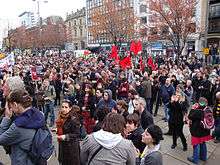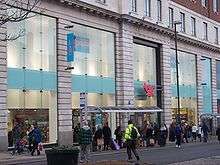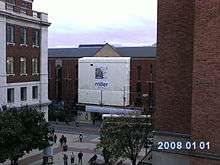The Headrow
Coordinates: 53°47′58″N 1°32′42″W / 53.7995°N 1.5450°W


The Headrow is a street in Leeds city centre, West Yorkshire, England. It houses many of the city's civic and cultural buildings including Leeds Town Hall, Leeds Central Library, Leeds Art Gallery, The Henry Moore Institute and The Light. Some of the largest retail floorplates in the city are on The Headrow, particularly between Park Row and Briggate, where major chains have opened flagship stores. The Headrow is part of a longer axis that includes Westgate, Eastgate and Quarry Hill.
The Headrow forms a spine across the city centre between Westgate and Eastgate and is approximately ½ mile (700 m) long. It was widened between 1928 and 1932 in a redevelopment designed by architect Reginald Blomfield primarily as a way of improving traffic flow through city centre. The area has an advisory speed limit of 15 miles per hour (24 km/h). The section between Park Row and Briggate is reserved for buses and taxis and cars/motorcycles are not permitted to use it between 5am and 10pm.
History

Appearing on maps in 1560, the Headrow once formed the northern edge or "head" of medieval Leeds' boundary, hence its name. To the east the street crossed Sheepscar Beck, a tributary of the River Aire now culverted, and continued, known as "The Street", to York. In the 17th century it was renamed Parke Lane, Burley Bar, Upper Head Row and Lower Head Row. Renamed again in the 19th century, at the junction with Albion Street the street ran to the east as Upperhead Row and Lowerhead Row and to the west as Park Lane and Guildford Street - once home to St Anne's Cathedral which was demolished in November 1904 and relocated to Cookridge Street. More recently, running east-to-west, the street became Eastgate, the Headrow and Westgate, though portions of Park Lane remain at the far end of Westgate.
Developments included the construction of Permanent House, the headquarters of the Leeds Permanent Building Society, Lewis's department store and the Odeon Cinema which opened as the Paramount Theatre. Headrow House was constructed in the 1950s. The redevelopment is designed in a uniform neo-baroque style similar to Regent Street in London also designed by Reginald Blomfield. The buildings are clad in red brick and Portland stone as opposed to Portland stone only on Regent Street. The development of the Headrow as a road-widening scheme meant that the north side was constructed in the uniform style while the south side has a mixture of buildings from the 1800s to the present.
Retail

Today the street is one of Leeds' principal shopping streets. The former Permanent House, now known as The Light on the north side, houses high end stores. There is ground floor retail in Direct Line House (originally Headrow House) on Dortmund Square. St John's Shopping Centre and The Headrow Centre flank opposite sides of Dortmund Square, on The Headrow. Broadgate, formerly Lewis's and later Allders, houses branches of T.K. Maxx, Argos, Ark Clothing, Clas Ohlson and Sainsbury's. The former Odeon is now a Primark store.
Opposite the former Odeon cinema is Crash Records, which has been a fixture of the Leeds music scene for 30 years.
Attractions
The Light houses a 13-screen multiplex cinema operated by Vue and a Virgin Active Gym, Radisson SAS Hotel and restaurants and bars. There are several art galleries on The Headrow axis, including the major Leeds City Art Gallery and New Briggate gallery.
Victoria Gardens
At the western end of the Headrow is Victoria Gardens, Leeds' Speakers' Corner, best known as the location of the war memorial, and where justice and anti-war rallies have gathered and terminated. The area is surrounded by Leeds Town Hall, Leeds City Art Gallery, The Henry Moore Institute and Leeds Central Library. The Light shopping centre is on the eastern side.
Dortmund Square
In 1980, the area between Headrow House and Lewis store was converted to Dortmund Square. To celebrate ten years of twinning the people of Dortmund presented the people of Leeds with a bronze statue, sculpted by Arthur Shulze-Engels, of the Dortmund Drayman which stands in the square.
The future

Future developments on The Headrow include Eastgate Quarters a shopping centre which will include a John Lewis department store, more than 100 shops, bars and restaurants, cinemas, a gym, offices and flats. Cavendish House, adjacent to The Headrow Centre has been reclad and rebranded as Basilica. The tower comprises apartments and offices, while the podium is home to PC World.
External links
| Wikimedia Commons has media related to The Headrow. |
_001.jpg)
